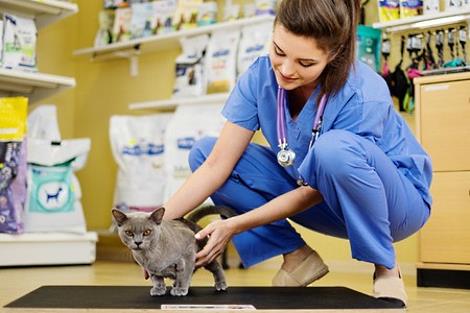Do you take your cat to the veterinarian for well visits? Closely watching for changes in appetite or behavior is wise, and additional routine veterinary visits provide even more benefits for your pet—for as you might know, prevention is better than any treatment plan.

Here are six reasons to take a healthy cat to veterinarian:
- Early diagnoses. The potential for early diagnosis of diseases is the most obvious reason to take a cat for a well visit. All diseases respond to treatment better if diagnosed earlier, and for certain problems, early diagnosis is crucial. For example, unlike in other animals, diabetes mellitus can be treated in cats, but only if the disease is diagnosed early.
- Reveal hidden problems. Veterinarians are trained to look for signs of poor health and often notice things a regular cat owner wouldn’t see. Cats are experts at masking their weaknesses—a skill that increased their ancestors’ survival rate many fold. Cats are good at hiding their pain, such as lameness or back pain, which can be observed as subtle changes in activity and sensitivity to touch. At the same time, several conditions, such as hyperthyroidism, show signs only late in development; however your vet can diagnose the condition before the first sign (weight loss) emerges.
- Get advice on diet, behavior, and care. Whenever you have a question regarding your cat, the modern solution is to Google it (you likely read this because of the same habit), but having advice from a professional who has actually seen your cat is irreplaceable. For example, in the United States 58% of cats are overweight, yet most owners claim that their pets are only fluffy or have big bones, at least until their veterinarians examine the cats and conclude otherwise. Maintaining proper weight can help prevent certain diseases. Your veterinarian also can show you how to trim your cat’s claws and hold him properly. You could read a book about it, or you could learn about it with a 15-minute veterinary consultation. In case your pet needs consultations from other pet care professionals (behaviorists, groomers), your vet can give you a good recommendation or two.
- Let your veterinarian know more about your cat. When your cat visits the veterinarian regularly, the vet will gather history, including weight, vital signs, blood and urine tests, eating habits, etc. Put simply, a well visit lets your veterinarian get to know your cat. Your vet will be much better equipped for any situation, if he or she has more information.
- Follow up with vaccinations and worm medicine. If you are like most people, you do know approximately when to update your pet’s shots, but it’s easy to forget and postpone to the next month or next year. Following a vaccination plan is crucial, not only for your pet’s health, but for the rest of the pet and human population; at the same time, look for a veterinarian who doesn’t vaccinate unnecessarily.

- Cat gets used to visiting veterinarians. A veterinarian visit is a stressful experience, not because vets “send negative vibes” toward animals, but because, from your cat’s perspective, good things rarely happen at a clinic. Well visits, on the other hand, can teach your cat that not all visits start in panic, continue in misery, and end painfully. Although the vet might take blood at a well visit, you will get your cat back home non-medicated and less oppressed, and you will be able to make your cat feel better by playing with him or giving him a treat.
Taking your cat to a veterinarian once a year is good for most cats. However, pets with chronic conditions or higher risks as well as senior cats will benefit from checkups twice a year. Additionally, whenever you notice odd behaviors or signs, don’t hesitate; contact your veterinarian.
